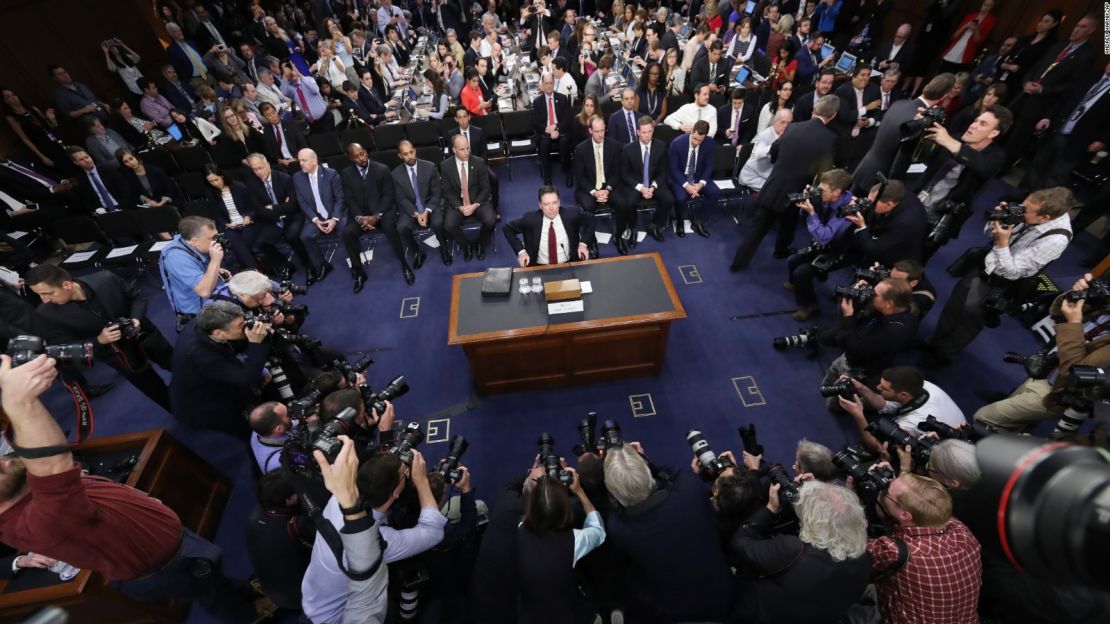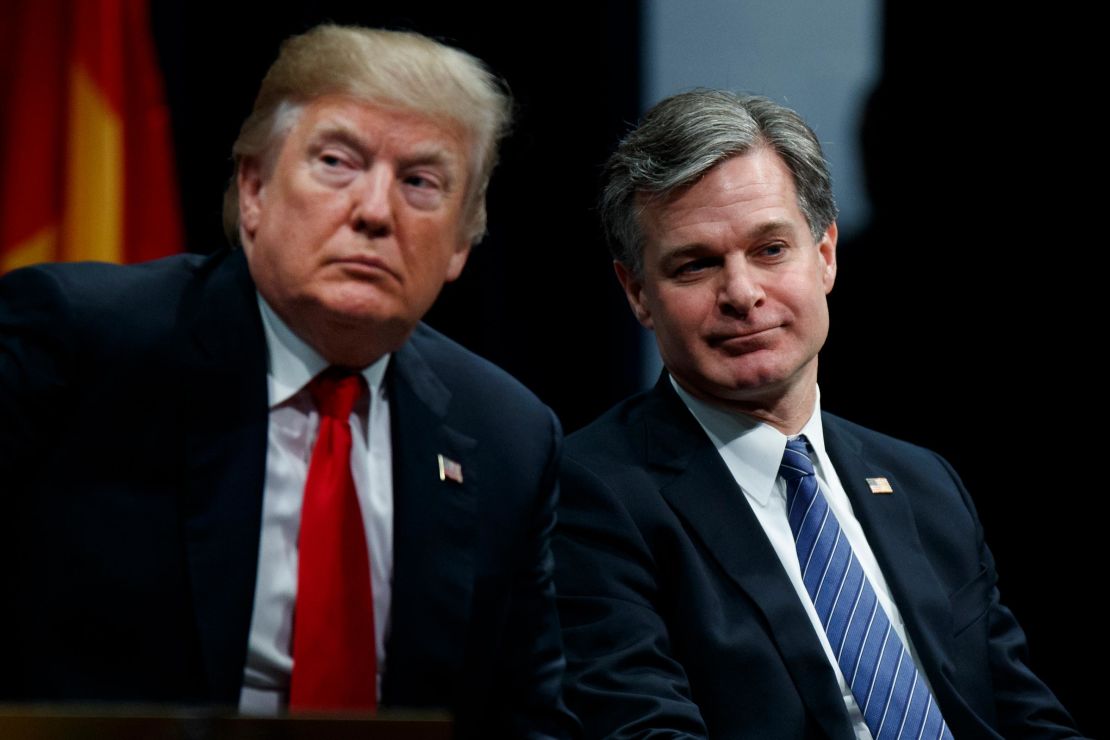A version of this story appeared in CNN’s What Matters newsletter. To get it in your inbox, sign up for free here.
CNN
—
President-elect Donald Trump is still putting together his Cabinet for his second term, and many other government positions will open up when he takes the oath of office in January.
But there’s a growing expectation that he will quickly make at least one new vacancy by firing FBI Director Christopher Wray.
There would be some circularity in that particular personnel move since it was Trump who hired Wray, a Republican, by nominating him to a 10-year term in 2017. That said, Trump has never shied away from firing someone he once backed.
FBI directors get those 10-year terms as the result of a post-Watergate law that was in response to J. Edgar Hoover’s much-too-long and controlling 48-year leadership of the FBI.
The term length is supposed to inoculate the director from political pressure. But it never works out that way.
If Trump fires Wray, he’d be first president to fire 2 FBI directors
Trump famously fired then-FBI Director James Comey months after taking office for his first term in 2017. Comey was also a Republican, although he was nominated to the position by Democratic President Barack Obama. (Comey later said in 2018 that he “can’t be associated with” the Republican Party due to Trump’s influence on the GOP.)
Presidents before Trump pushed FBI directors out
In 1993, Bill Clinton fired then-FBI Director William Sessions after an internal ethics report emerged during the prior year’s presidential campaign. It included questions about a $10,000 fence installed around the director’s home and flights he had taken, among other issues.
Earlier, Jimmy Carter suggested during the 1976 presidential campaign that he would have fired then-FBI Director Clarence Kelley over revelations about window drapery valances improperly installed at his home, among other things. Carter did not immediately fire Kelley when he took the White House, but Kelley was ultimately forced to resign, according to Douglas Charles, a history professor at Penn State University, who noted that the drapery scandal “today seems like very small fry stuff.”
But at the time, it would have tested the new law, which Congress passed in 1976, for Carter to fire Kelley.
“There certainly was the question, can any president fire an FBI director when there’s a legislated 10-year term,” Charles said.
While that question has clearly been answered now, those previous firings were about ethics and personal failings. Trump’s are about policy differences, including over the role of the Justice Department overall.
Why did Trump fire Comey?
The stated reasons for Comey’s firing, laid out in a memo prepared for Trump’s Justice Department, were contradictory. Comey was criticized both for not prosecuting Hillary Clinton over her treatment of classified material and then for releasing “derogatory” information about Clinton at a press conference.
The real reason Comey was fired, as Trump admitted to NBC News at the time, was Comey’s investigation into ties between Trump’s 2016 campaign and Russia.

Then Trump’s troubles cascaded
In the furor that followed Comey’s firing, it was the author of the Justice Department memo recommending Comey’s firing, then-Deputy Attorney General Rod Rosenstein, who appointed a special counsel to follow up on the Russia investigation.
Rosenstein appointed the special counsel because Trump’s attorney general, Jeff Sessions, had recused himself from any investigation related to Trump’s 2016 campaign. Sessions did so because he had failed during Senate confirmation hearings to disclose preelection contacts he had with Russia’s ambassador to the US at the time.
Enter another former FBI director
Who did Rosenstein pick as special counsel to lead that Russia investigation? Robert S. Mueller III, who happened to be the former FBI director. Mueller was widely respected and had taken charge of the FBI days before the 9/11 attacks in 2001. Congress passed a special law to extend his term by two years during the Obama administration.
Anyone who remembers Trump’s first term can recall that speculation about the Russia investigation sucked up much of the oxygen in Washington and led to the prosecution of several of Trump’s top 2016 campaign aides, including campaign chairman Paul Manafort, who Trump later pardoned. Trump has complained that the investigation was part of a “deep state” effort to undermine him.
Unintended consequences
The cooperation by Trump’s former fixer Michael Cohen with Mueller’s investigation is what led to revelations about hush money payments for which Trump was convicted in New York earlier this year. Trump’s sentencing for his conviction on 34 counts of falsifying business records has been delayed indefinitely after his election win.
What the Mueller report concluded
The release of Mueller’s report was slow-walked by Trump’s second attorney general, Bill Barr, who gave the impression that Mueller’s report exonerated Trump. It did not.
Mueller was constrained by Justice Department rules that bar the prosecution of a sitting president. When the full report was released in April 2019, Mueller said there was not enough evidence to prove collusion between Trump’s campaign and Russians. It also specifically did not exonerate Trump.
“While this report does not conclude that the President committed a crime, it also does not exonerate him,” the report said. It also concluded that while Trump’s campaign in 2016 expected help from Russia, it didn’t conspire with Russia. That gets forgotten after years of Trump referring to Mueller’s investigation as the “Russia hoax.”
There are things that helped generate the Mueller investigation, notably the discredited Steele dossier, that will forever anger Trump.

Trump targeted FBI officials
There were also related scandals, such as the release of anti-Trump texts by an FBI agent at the time, Peter Strzok, who initially played a role in Mueller’s inquiry, and Lisa Page, who was then an FBI attorney with whom Strzok was having an affair. The FBI agreed in July of this year to pay $2 million to Strzok and Page to compensate for the release of those text messages.
Another FBI official, Andrew McCabe, who served briefly as acting director after Trump fired Comey, was fired by Sessions days before his retirement. McCabe, now a CNN contributor, ultimately won back his pension in court.
Trump turned on Wray
Wray was overwhelmingly confirmed to succeed Comey in August 2017 in part by promising during confirmation hearings to maintain independence from the White House. Trump, meanwhile, prizes loyalty.
Even while Trump was still president in 2020, he had already turned on Wray, in part because he felt Wray was not cooperating with special counsel John Durham – who was appointed by Barr, Sessions’ replacement, to investigate the Mueller investigation.

All of that adds up to why Trump wants loyalists at the Department of Justice, including the FBI.
Douglas said that about 100 years ago, in the wake of the Teapot Dome scandal that exposed corruption within the federal government, there was talk in the Senate of taking the Department of Justice, including the FBI, completely out of politics and making it and all of its employees an independent part of the civil service.
Trump wants to go in the opposite direction today and bring the FBI more under the control of the president.



